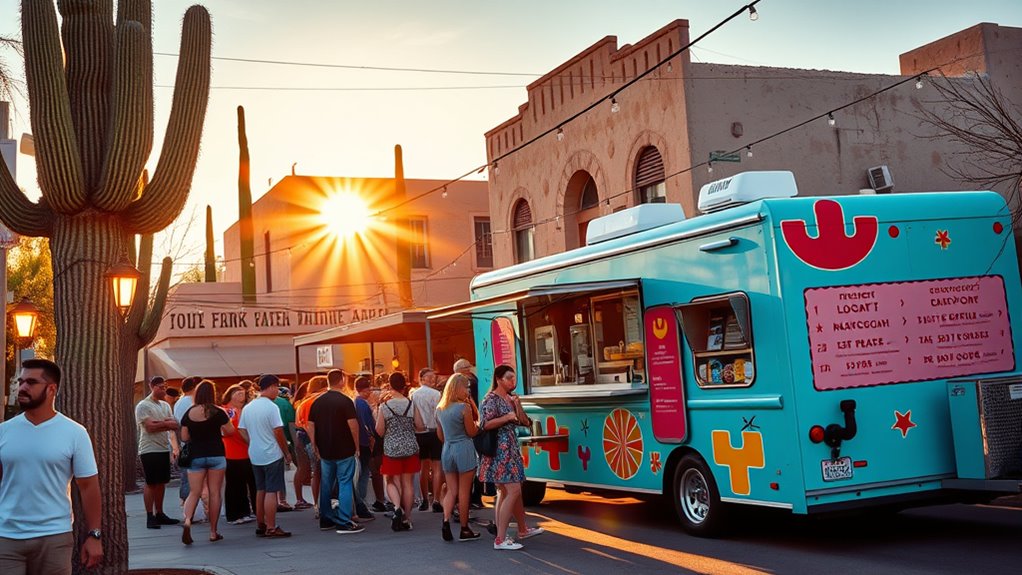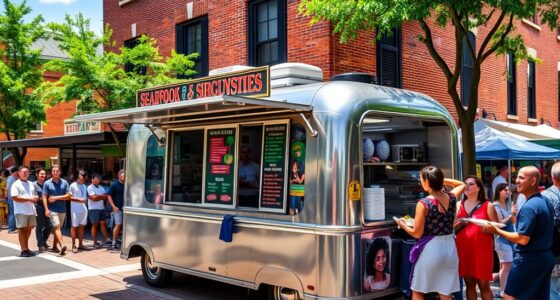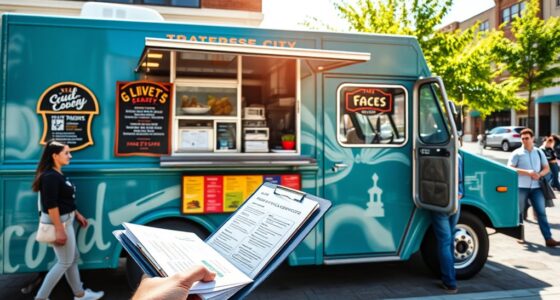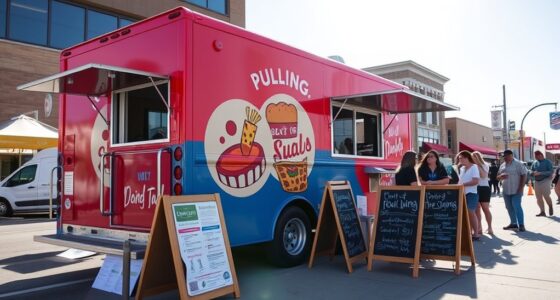To open a food truck in Tucson, you’ll need permits like the Mobile Food Vendor Permit and local license, which require applying at least 14 days in advance. Budget around $5,000 to $10,000 monthly for expenses and plan for costs like market fees, insurance, and equipment. Choose high-traffic locations and develop a compliant menu with fresh, safe ingredients. For tips on stayin’ compliant, finding spots, and marketing, keep exploring so you stay ahead of the game.
Key Takeaways
- Obtain necessary permits such as the Mobile Food Vendor Permit and Special Event Vendor Permit, applying at least 14 days in advance.
- Budget $46,700 to $187,440 for startup costs, plus ongoing monthly expenses of $5,000 to $10,000.
- Choose high foot traffic locations like downtown or event venues, ensuring compliance with local zoning and health regulations.
- Develop a manageable menu emphasizing food safety, local ingredients, and options for diverse dietary preferences.
- Maintain detailed records of inspections, renew permits annually, and leverage social media for marketing and customer engagement.
Navigating Tucson’s Permit and Licensing Landscape
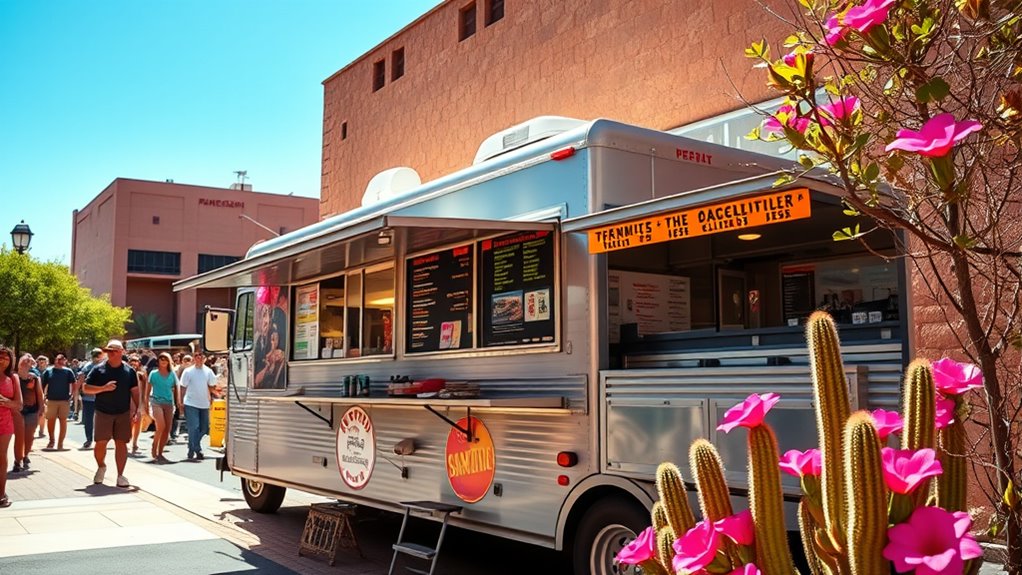
Understanding Tucson’s permit and licensing landscape is essential for food truck operators to operate legally and avoid fines or delays. First, you’ll need the Mobile Food Vendor Permit, which is specific to trucks and overseen by the Pima County Health Department. If you plan to sell at events, a Special Event Vendor Permit is required for each event’s duration. For street vending on sidewalks or rights-of-way, you must obtain a Street Vending Permit, while downtown vendors need a Downtown Vending Permit with additional rules. If you don’t have a permanent Tucson location, you’ll need a Transient/Itinerant Vendor License. All permits require an application at least 14 days in advance, and some, like the plan review, involve fees and detailed documentation. Ensuring compliance from the start helps you stay on the right side of the law. Permits must be renewed annually. Additionally, understanding cultural and regional preferences can help tailor your menu to appeal to local customers and boost your success.
Understanding Costs and Fee Structures for Mobile Food Vendors
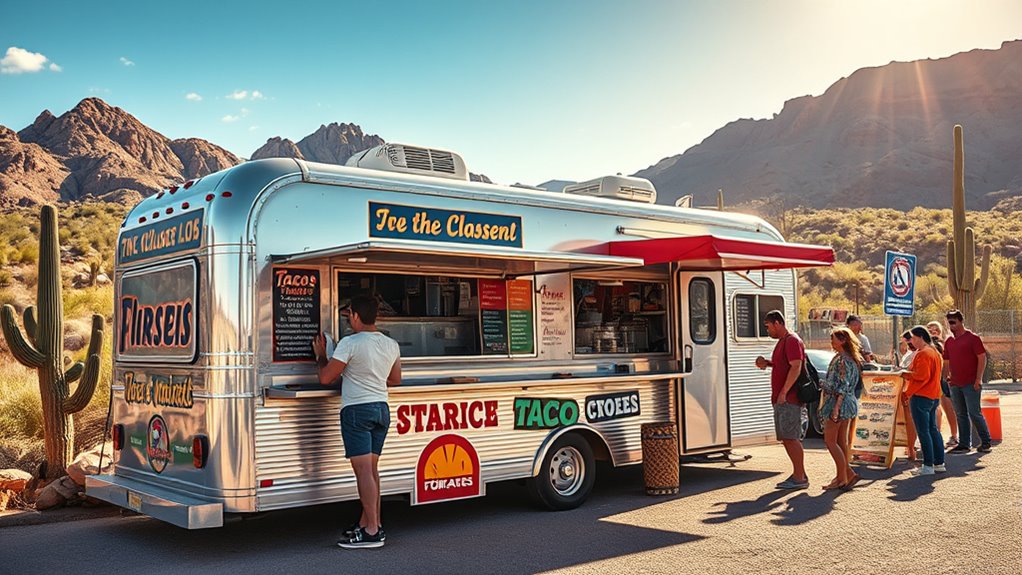
Getting a food truck up and running involves more than just buying or leasing a vehicle; you need to be aware of the costs and fee structures that will impact your budget. Startup costs can range from $46,700 to $187,440, depending on whether you buy new or used, and how you outfit your kitchen. Expect to spend around $1,000 to $2,000 upfront on inventory. Licensing, permits, and insurance are essential, with costs varying regionally but likely similar to other Arizona cities. Monthly expenses typically fall between $5,000 and $10,000, covering fuel, labor, supplies, and maintenance. Additional fees include commissary rentals, insurance, payment processing, and marketing. Regional factors like climate and local suppliers can influence ongoing costs, so plan accordingly. It’s important to consider installation and maintenance when selecting your equipment to ensure longevity and optimal performance.
Choosing Prime Locations and Operating Regulations
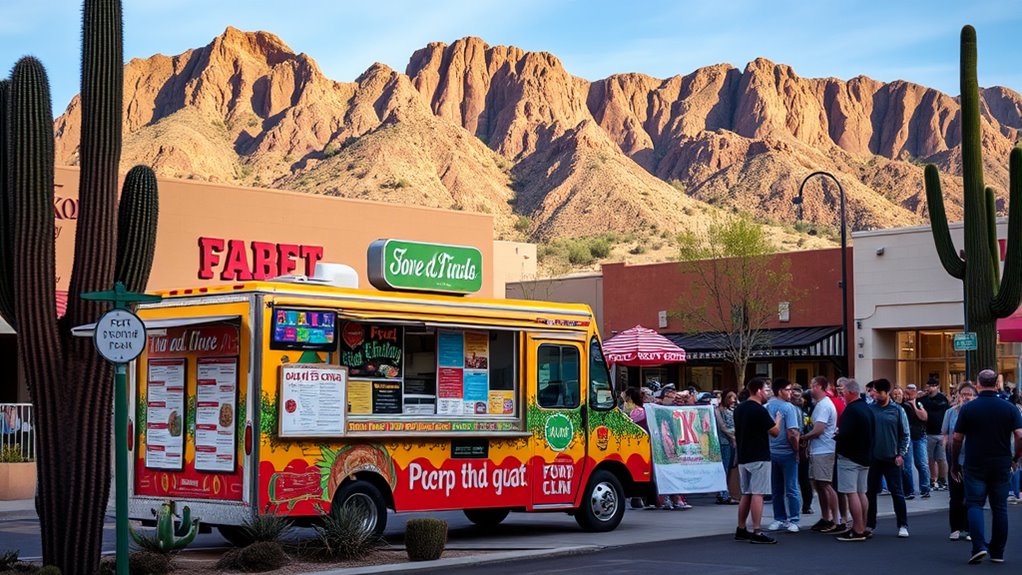
Choosing the right location can make or break your food truck’s success in Tucson. Focus on areas with high foot traffic, like downtown or near event venues, to maximize visibility. Food truck courts are now recognized as a land use category, offering shared infrastructure for multiple vendors. These sites include parking, restrooms, and electrical hookups, meeting health standards. Additionally, selecting a strategic location that aligns with your target audience can significantly enhance your sales and brand presence.
Developing a Compliant and Appealing Menu
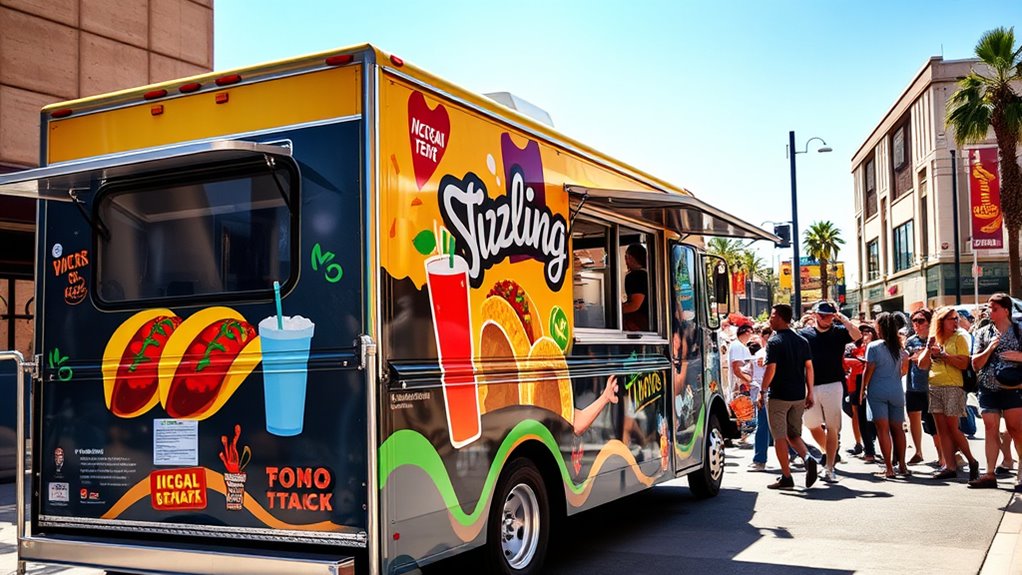
Have you considered how your menu can both delight customers and stay within Tucson’s strict health and safety standards? Your menu must include only foods prepared, cooked, and stored following Arizona food safety regulations to prevent contamination. Since mobile units prepare TCS foods on the day of sale, holding leftovers from previous days generally isn’t allowed unless approved. Every menu change requires prior approval from the health authority, so plan accordingly. Focus on items that can be efficiently assembled, cooked, reheated, and served within your truck’s setup, using ingredients from an approved commissary. Keep your menu manageable in size, offering popular, locally inspired dishes with vegetarian, vegan, and allergen-friendly options. Clear descriptions and seasonal adjustments will help attract diverse customers while maintaining compliance. Menu modifications must be approved by health authorities before implementation to ensure ongoing compliance. Additionally, understanding food safety standards is essential for maintaining high-quality and safe offerings.
Crafting an Effective Marketing and Business Strategy
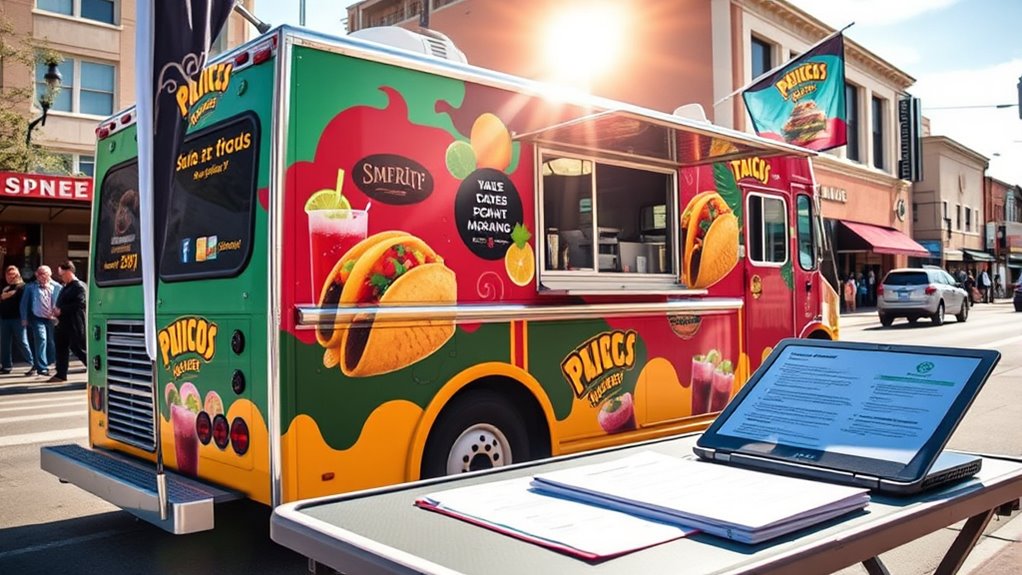
To build a successful food truck business in Tucson, you need an effective marketing and business strategy that resonates with your target audience. Focus on Millennials and Gen Z, who value variety, quick service, and local, sustainable ingredients. Leverage social media platforms like Instagram, TikTok, and Facebook to showcase your daily locations, menu highlights, and community events. Use engaging visuals, hashtags, and customer-generated content to boost visibility. Collaborate with local businesses and participate in festivals to expand your reach. Analyze your sales and social media data to refine your approach and identify high-performing locations. Build your brand story around Tucson’s local culture, sustainability, and unique flavors. Community engagement is essential for building customer loyalty and increasing visibility. Consistent engagement and community partnerships will help you attract loyal customers and grow your business. Incorporating sound healing science principles into your branding or customer experience can create a memorable and soothing atmosphere that encourages repeat visits.
Ensuring Ongoing Inspection and Compliance
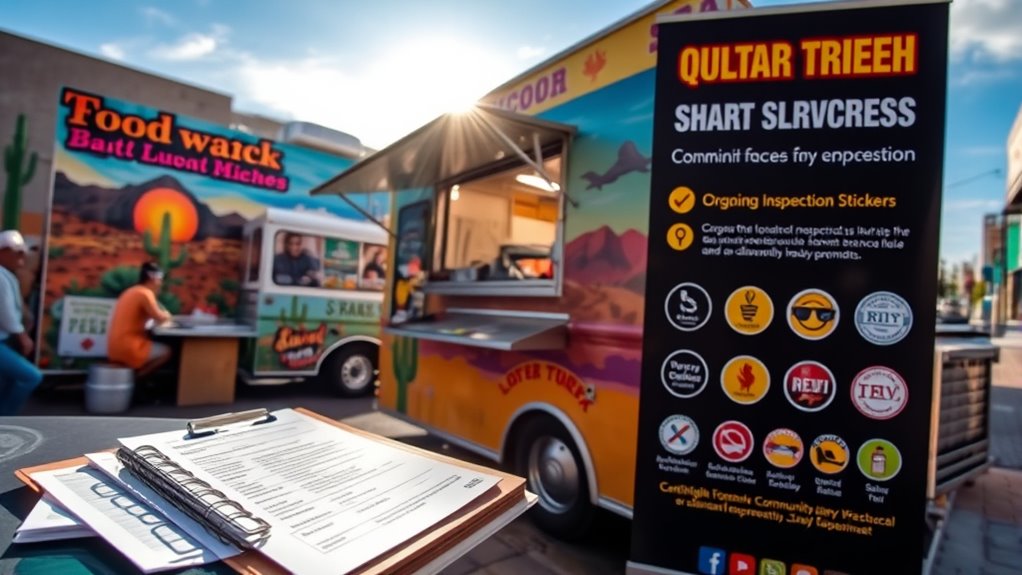
To stay compliant, you need to keep up with regular permit renewals and make sure all inspection records are up-to-date and accessible. Reporting any operational changes promptly helps the health department stay informed and maintain your approval status. Staying organized and proactive in these areas keeps your food truck running smoothly and avoids costly violations. Additionally, maintaining vetted documentation of all compliance activities ensures transparency and simplifies audits or inspections.
Regular Permit Renewals
Regular permit renewals are essential for keeping your food truck operating legally and in compliance with Tucson’s regulations. You need to renew annually, typically 30-60 days before your permit expires. Missing the deadline can lead to fines or suspension. Renewal keeps your business compliant and allows you to update details like operating hours, locations, or vehicle info. You’ll need to submit an updated insurance certificate, a current Tucson business license, and proof of your TPT license, which costs $12 annually. Additionally, passing a health and safety inspection is required to verify ongoing compliance. Staying current with regulatory requirements ensures your food truck remains operational and avoids unnecessary penalties.
Inspection Record Maintenance
Maintaining accurate inspection records is essential for keeping your food truck compliant with Tucson’s health and safety regulations. Proper documentation demonstrates ongoing adherence to standards and helps prevent penalties during inspections. To stay compliant, focus on these key areas:
- Keep copies of inspection reports and certificates, ensuring they’re up-to-date and accessible on your truck.
- Maintain logs of commissary visits, especially when handling TCS foods, following approved formats and storing them at the commissary.
- Document corrective actions taken for any violations, including repairs or adjustments, to show continuous compliance.
- Ensuring color accuracy in your documentation can highlight the importance of precise record-keeping, as it directly impacts your ability to demonstrate compliance.
Regularly updating and organizing these records makes permit renewal easier and demonstrates your commitment to food safety and sanitation, helping you avoid costly violations and inspections issues.
Reporting Operational Changes
Reporting operational changes promptly is crucial for keeping your food truck compliant with Tucson’s health regulations. You must notify the health department within one week of any substantial changes to daily operations, such as menu modifications, service methods, or location shifts. This includes submitting updated commissary agreements or operational plans for approval. Failing to report these changes can lead to permit revocation or fines. Any adjustments affecting permit validity, like ownership or insurance status, must also be reported immediately. Changes to menu preparation or food safety protocols require prior approval to ensure continued compliance. Additionally, updates to commissary arrangements or servicing areas need quick reporting to maintain permits. Regular monitoring confirms that your operational adjustments meet health standards and keep your food truck compliant. Incorporating specialized equipment like self-watering or waterless planters can help maintain sanitation standards and improve overall operational efficiency.
Frequently Asked Questions
How Long Does the Permit Approval Process Typically Take in Tucson?
You’re probably wondering how long the permit approval process takes in Tucson. Typically, standard vendor permits take 2-4 weeks, but food vendor permits can take 4-8 weeks due to health department reviews. If you apply early and submit complete paperwork, you improve your chances of faster approval. Keep in mind, special event permits need application at least 30 days in advance, and expedited options can cut wait times but cost more.
Are There Specific Insurance Requirements for Mobile Food Vendors in Tucson?
Did you know Tucson mandates at least $2 million in general liability insurance for food trucks? You need to carry specific coverage, including general liability, commercial auto, workers’ compensation if you have employees, and property insurance. You must name the City of Tucson as the certificate holder and provide proof with your permits. Failing to meet these requirements risks permit revocation and fines, so verify your policies are up to date.
Can I Operate My Food Truck Outside Tucson City Limits?
You can operate your food truck outside Tucson city limits, but you’ll need to follow Pima County regulations. Make sure your truck is registered with an approved commissary, and submit a commissary agreement. You’ll also require plan review approval, health permits, and possibly a temporary food permit for events. Keep in mind, compliance with county codes for signage, marketing, and location restrictions is essential to operate legally outside Tucson.
What Are the Restrictions on Menu Changes After Initial Approval?
When you consider menu changes, you must submit them for approval before making any adjustments. You’re required to detail preparation methods, storage, and safety measures, especially if altering TCS foods. Failing to get approval can lead to penalties or permit revocation. Your modifications should be timely and thoroughly documented, ensuring compliance with health codes. Remember, regulations limit quick adaptations, so plan ahead and maintain records to stay compliant and avoid fines or closure.
How Can I Qualify for Fee Reductions or Incentives in Tucson?
Imagine stepping into a scene from the past—your journey to qualify for Tucson’s incentives begins now. You can save by participating in Pima County’s health programs, ensuring full compliance, and submitting the required paperwork. For city incentives, invest at least $5 million, create quality jobs, and meet wage standards. Downtown Tucson offers permit fee waivers, while sustainability rebates reward eco-friendly water systems. Act now to access these benefits!
Conclusion
To succeed with your Tucson food truck, stay informed, stay compliant, and stay creative. Secure the right permits, understand the costs, choose prime locations, develop a flavorful menu, and craft a strong marketing plan. Keep up with inspections and regulations, adapt to changing trends, and always prioritize quality and customer service. By balancing preparation, compliance, and passion, you’ll turn your food truck into a thriving part of Tucson’s vibrant food scene.
